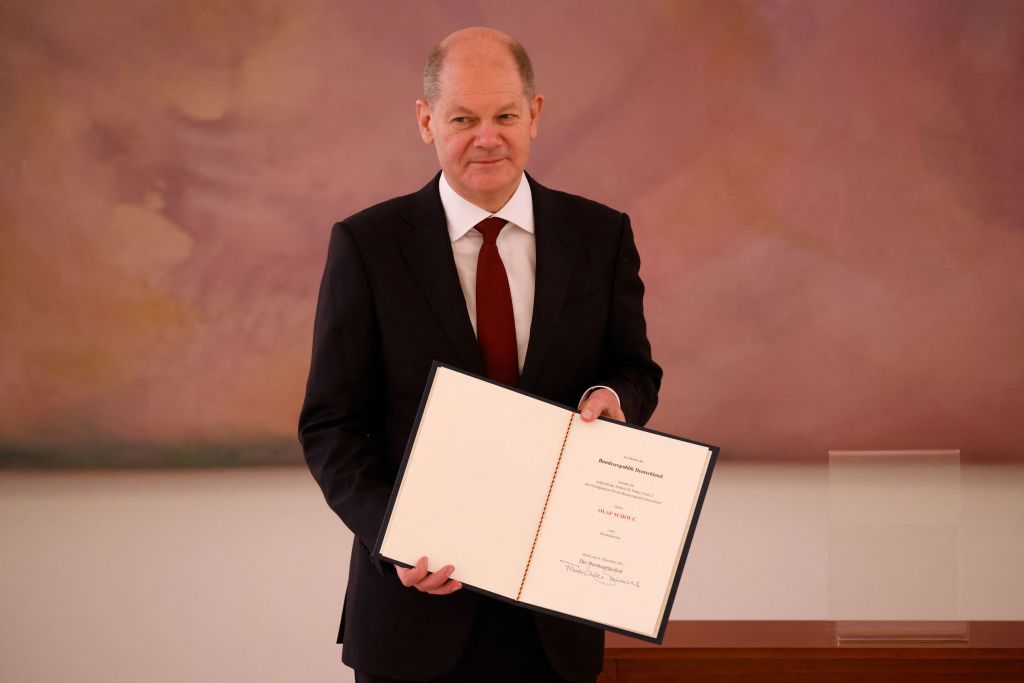Germany's parliament elects Olaf Scholz chancellor, formally ending Angela Merkel's long tenure


A free daily email with the biggest news stories of the day – and the best features from TheWeek.com
You are now subscribed
Your newsletter sign-up was successful
The German parliament, or Bundestag, elected Olaf Scholz as the country's ninth post-World War II chancellor on Wednesday, a day after his center-left Social Democrats formalized a new government with the environmentalist Greens and pro-business Free Democrats parties. After the vote, Scholz met with President Frank-Walter Steinmeier to formalize the appointment, and he will be sworn in Wednesday afternoon, officially ending Angela Merkel's 16 years in office.
Merkel, 67, decided to retire after 31 years politics and did not stand for re-election in September's election, but she has stayed on as caretaker chancellor until the new government is sworn in. Scholz's party narrowly defeated Merkel's center-right Christian Democratic Union-Christian Social Union bloc, and his three-party coalition holds 416 seats in the 736-seat lower house of parliament. He was elected chancellor on a 395-303 vote, with six abstentions, as Merkel watched from the spectator gallery.
Scholz, 63, has been Germany's vice chancellor and finance minister since 2018, in a coalition government with Merkel's bloc. In the new government, Greens co-leaders Robert Habeck and Annalena Baerbock will be vice chancellor and foreign minister, respectively, while Free Democrats leader Christian Lindner will be finance minister. Habeck will also head a revamped economy and climate ministry.
The Week
Escape your echo chamber. Get the facts behind the news, plus analysis from multiple perspectives.

Sign up for The Week's Free Newsletters
From our morning news briefing to a weekly Good News Newsletter, get the best of The Week delivered directly to your inbox.
From our morning news briefing to a weekly Good News Newsletter, get the best of The Week delivered directly to your inbox.
Scholz has signaled continuity in foreign policy with Merkel's government, but his coalition has ambition climate goals, including a quicker-than-planned phase-out of coal and switch to renewable energy sources. They have also prioritized modernizing Germany's mobile and internet networks. The new government's first priority, however, will be urgently tackling Germany's COVID-19 pandemic.
A free daily email with the biggest news stories of the day – and the best features from TheWeek.com
Peter has worked as a news and culture writer and editor at The Week since the site's launch in 2008. He covers politics, world affairs, religion and cultural currents. His journalism career began as a copy editor at a financial newswire and has included editorial positions at The New York Times Magazine, Facts on File, and Oregon State University.
-
 NIH director Bhattacharya tapped as acting CDC head
NIH director Bhattacharya tapped as acting CDC headSpeed Read Jay Bhattacharya, a critic of the CDC’s Covid-19 response, will now lead the Centers for Disease Control and Prevention
-
 ‘Poor time management isn’t just an inconvenience’
‘Poor time management isn’t just an inconvenience’Instant Opinion Opinion, comment and editorials of the day
-
 Witkoff and Kushner tackle Ukraine, Iran in Geneva
Witkoff and Kushner tackle Ukraine, Iran in GenevaSpeed Read Steve Witkoff and Jared Kushner held negotiations aimed at securing a nuclear deal with Iran and an end to Russia’s war in Ukraine
-
 Pentagon spokesperson forced out as DHS’s resigns
Pentagon spokesperson forced out as DHS’s resignsSpeed Read Senior military adviser Col. David Butler was fired by Pete Hegseth and Homeland Security spokesperson Tricia McLaughlin is resigning
-
 Judge orders Washington slavery exhibit restored
Judge orders Washington slavery exhibit restoredSpeed Read The Trump administration took down displays about slavery at the President’s House Site in Philadelphia
-
 Kurt Olsen: Trump’s ‘Stop the Steal’ lawyer playing a major White House role
Kurt Olsen: Trump’s ‘Stop the Steal’ lawyer playing a major White House roleIn the Spotlight Olsen reportedly has access to significant US intelligence
-
 Hyatt chair joins growing list of Epstein files losers
Hyatt chair joins growing list of Epstein files losersSpeed Read Thomas Pritzker stepped down as executive chair of the Hyatt Hotels Corporation over his ties with Jeffrey Epstein and Ghislaine Maxwell
-
 Judge blocks Hegseth from punishing Kelly over video
Judge blocks Hegseth from punishing Kelly over videoSpeed Read Defense Secretary Pete Hegseth pushed for the senator to be demoted over a video in which he reminds military officials they should refuse illegal orders



